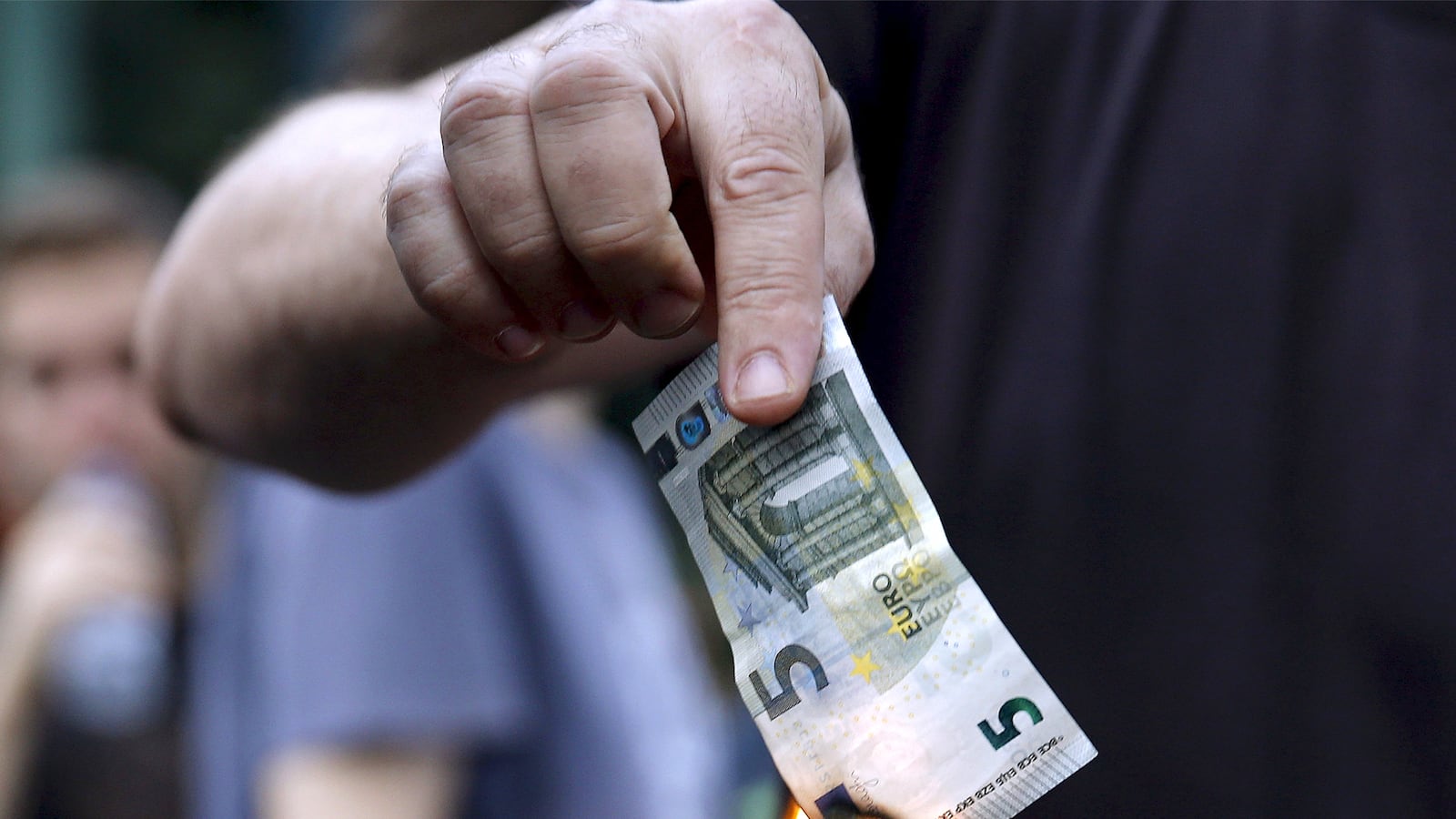UPDATE, 2 a.m. EDT: This story has been updated to reflect Greece going into default.
It’s a seemingly nondescript photo. A middle-aged man stands withdrawing money at an ATM near the Greek Parliament in Athens. But this man is Nikos Filas, MP and parliamentary spokesman of Greece’s governing party, Syriza. A few weeks ago he told me he was hopeful that a deal with Greece’s creditors would be struck by the end of June. Then, a mere three days ago, he became just one of thousands of Athenians desperate to get their hands on cash as rumors of a national bank shutdown spread throughout the country.
June 30 was the date that Greece was supposed to meet another debt repayment of €1.6 billion ($1.8 billion) to its creditors, the European Central Bank (ECB), the International Monetary Fund, and the European Commission. It failed to do so, and officially defaulted.
This scenario is something Greek Prime Minister Alexis Tsipras was desperate to avoid, and Greek negotiators climbed down in several areas during talks over the last week. It was a fraught situation. Tsipras repeatedly reaffirmed his commitment to staying in the Eurozone. He knew that default carried with it the real possibility of Greece’s exit from the Eurozone and subsequent financial implosion for his country.
But not everyone in the party has been of one mind. Syriza, more than a unified party, is a coalition of leftist forces; indeed, its name means “coalition of the radical left.” These forces range from hardcore communists, who reject the Eurozone on principle, to a mainstream centered on the prime minister and his allies, who remain ideologically opposed to austerity but wish to remain in the Eurozone; to those on the right of the party who are desperate to stay in the Euro whatever the cost.
So Tsipras was stuck. He needed a deal that would be both acceptable to the hardliners in his party and hardliners among the creditors, especially the IMF, which has taken a particularly tough stance on Greece.
In the end, he decided to wash his hands of both sets of hardliners and go directly to the Greek electorate by publicly announcing that on July 5 the country would hold a referendum on the terms offered by the creditors. The people, he said, would decide.
The effect was explosive. The European Commission chief, Jean-Claude Juncker, in a rare display of emotively undiplomatic language, said he felt “betrayed” by Greece’s “egotism” in the talks and further added that Greek proposals had been “delayed” or “deliberately altered.” Financial markets fell globally. In Greece, panicked citizens rushed to ATMs to withdraw as much money as possible, fearing that capital controls, which restrict the flow of money in and out the economy, would be imposed and the country’s banks shut down.
They were right. On June 29 Greek banks were duly closed—until July 6—and ATM withdrawals limited to €60 ($67) per day. What so many had feared had arrived. The country is in turmoil and the government has been forced to announce that public transport will be free for the “Bank Holiday” week. Now in Greece everyone is asking the same thing: Did Tsipras do the right thing?
“I think it [calling the referendum] was a very bad idea,” says Melik Kaylan, a journalist who has covered the region for many years. “But I think Tsipras’s thinking went like this: If the Greek people reject the E.U., they can’t blame me for the consequences. They will have to live with their own decision. Otherwise it will look like he sold out one side or the other, acted out of weakness or hidden motives.”
But Syriza wasn’t done yet. On June 30, the due date of both the €1.6 billion IMF repayment and the expiration of the country’s bailout program, in a final effort to avoid default (which officially occurred at midnight), Tsirpas wrote to the chairman of the board of governors of the European Stability Mechanism (essentially a rescue fund for Eurozone countries), Jeroen Dijsselbloem, to request a two-year loan to cover Greek debt. He also requested the bailout program be extended “for a short period of time in order to ensure a technical default is not triggered.” Dijsselbloem responded that the Eurogroup would hold an “extraordinary” conference call at 7 p.m. to decide on its response but ended up rejecting both requests.
So just hours from default the situation remained as tense as ever. Markets rallied slightly as the prospect of a last-minute deal appeared, but the situation remained volatile in the extreme. The referendum on July 5 is on whether the Greek people should accept or reject the bailout package on offer. But no package has yet been agreed on—the Greeks broke off talks before one could be reached. It’s chaos, pure and simple.
Despite their obvious frustration with Syriza’s handling of the negotiations, it is clear the European Union does not want Greece to exit the Eurozone. On June 29, European Parliament President Martin Schulz called on Greeks to vote “yes” on the July 5 referendum and said he was prepared to come to Greece personally to campaign.
Meanwhile, in Athens, thousands of “Yes” supporters gathered in the rain in Syntagma Square in front of the Greek parliament to voice their support for staying in the Eurozone. For them, like many Greeks I have spoken to over the past few months, the prospect of a Grexit is terrifying.
“For the E.U., the prospect of Greece in total crisis is not so horrifying as it is for the Greeks themselves,” says Kaylan. “Once they vote no, if they do, they’re on their own and the E.U. can turn its back on the consequences. For the E.U., the much bigger issue is what happens if Greece sets an example of defiance for Spain et al. to follow.”
This point speaks to a fundamental truth: namely, that the crisis is as much about politics as economics. Other E.U. countries, notably Ireland, experienced severe financial crises, duly suffered E.U.-imposed austerity, and eventually recovered. If the creditors cave in to Greece, then their ability to impose what they believe is the correct financial medicine to problem economies will be drastically, if not totally, reduced.
As Greece’s Finance Minister, Yanis Varoufakis, admitted, Greece was unable to pay the €1.6 billion due by Tuesday. Now June 30 could mark the beginning of the end of Greece’s European dream. The consequences, both for Greece and the E.U., could be as frightening as they are unknowable.






